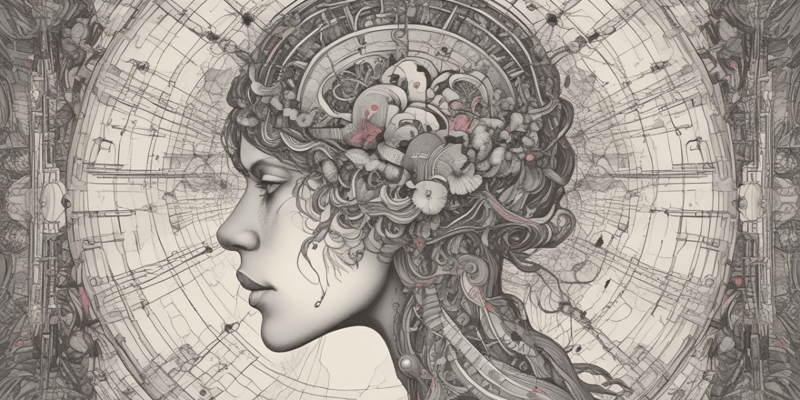52 Questions
What is the difference in the definition of symptom in Psychiatry compared to general medicine?
In Psychiatry, it includes both subjective and objective evidence
What is the term for the emotional state of an individual in Composition of Mind?
Affect
What is the term for the conduct of an individual in Composition of Mind?
Behavior
What is Autistic thinking an example of in the context of Formal Thought Disorder?
Concrete thinking
What is the purpose of testing with proverbs in the context of Formal Thought Disorder?
To assess abstract thinking
What is Concrete thinking an example of in the context of Formal Thought Disorder?
Thinking that takes literal meaning without understanding implicit meaning
What is the main difference between hallucination and illusion?
Hallucination is a false perception without an stimulus, while illusion is a false perception with an external stimulus.
Which type of hallucination involves smelling smells that do not exist?
Olfactory
What is the term for the loss of memory for recent events?
Anterograde amnesia
What is the term for the experience of a familiar situation as novel?
Jamais vu
What is the term for the impaired ability to identify time, place, and person?
Disorientation
What is the term for the inability to maintain attention?
Distractibility
What is the term for the clouding of conscious with quantitative changes in mental processes?
Confusion
What is the term for a state of complete suppression of motor activity?
Stupor
What is the term for a state of altered consciousness with detachment from the environment?
Twilight state
What is the term for a state of altered consciousness with memory loss and flight?
Fugue
What is tangentiality in the context of a disorder of stream of thinking?
Going off the core of the topic and not returning to it
What is the term for the sudden cessation of thought in the middle of a sentence?
Blocking
What is the term for a mixture of words and phrases that have no meaning?
Incoherence or word salad
What is the term for a false fixed belief that is not consistent with a person's educational and cultural background?
Delusion
What is the term for a thought disorder where an individual suddenly speaks very quickly and overlappedly?
Pressure of speech
What is the term for a false belief that one is being controlled by persons or objects?
Delusion of influence
What is the term for the repetition of the same word or idea in response to different questions?
Preservation
What is the term for a false belief that one has a physical disease that is not based on real organic pathology?
Delusion of hypochondria
What is the term for a thought disorder where an individual has a brief and uncommunicative speech?
Poverty of speech
What is the term for a false belief that one is a very powerful and important person?
Delusion of grandeur
What is the term for a heightened feeling of psychological wellbeing that is inappropriate to apparent events?
Euphoria
What is the term for a feeling of sadness that is appropriate to a real loss?
Grief
What is the term for holding two opposing emotions, attitudes, ideas, or wishes towards the same person, situation, or object?
Ambivalence
What is the term for a state of feeling, uneasiness, uncertainty, or dread resulting from a real or perceived threat whose actual source is unknown or unrecognized?
Anxiety
What is the term for a sudden, overwhelming anxiety of such intensity that it produces disorganization of the personality, loss of irrational thought, and inability to communicate, along with specific physiological changes?
Panic
What is the term for a person who performs activities of daily living within the normal range of activity?
Normal activity
What is the term for a subjective feeling of uneasiness, tension, and inability to sit still?
Restlessness
What is the term for a monotonous repetition of certain movement without purpose?
Stereotypy
What is the term for the maintenance of imposed postures, however abnormal they may be?
Waxy flexibility
What is the term for a voluntary assumption of an inappropriate or bizarre posture, generally maintained for long periods of time?
Catalepsy
What is the term for a heightened feeling of psychological wellbeing that is inappropriate to apparent events?
Euphoria
What is the term for the absence of both emotional experience and expression?
Apathy
What is the term for the holding, at the same time, of two opposing emotions, attitudes, ideas, or wishes toward the same person, situation, or object?
Ambivalence
What is the term for a state in which a person is easily annoyed and provoked to anger?
Irritable mood
What is the term for the feeling of sadness that is appropriate to a real loss?
Grief
What is the term for the feeling of intense happiness with mysterious air?
Exaltation
What is anxiety defined as in the context of emotions?
A state of feeling, uneasiness, uncertainty, or dread resulting from a real or perceived threat whose actual source is unknown or unrecognized.
What is the term for an intense irrational fear of an object, situation, or place?
Phobia
What is the term for a sudden, overwhelming anxiety of such intensity that it produces disorganization of the personality, loss of irrational thought, and inability to communicate, along with specific physiological changes?
Panic
What is hyperactivity divided into according to the level of severity?
Three levels: restlessness, psychomotor agitation, and excitement
What is stereotypy defined as?
A monotonous repetition of certain movement without purpose
What is waxy flexibility?
The maintenance of imposed postures, however abnormal they may be
What is negativism?
Frequent opposition to suggestion
What is compulsive behavior?
A senseless, persistent, repetitive behavior performed purposefully
What is catatonic posturing?
A voluntary assumption of an inappropriate or bizarre posture
What is echopraxia?
Imitating the movements of another person
Study Notes
Composition of Mind
- The mind consists of three components: Intellect, Affect, and Behavior
- Intellect: includes mental processes like thought, perception, orientation, memory, attention, concentration, judgment, insight, general knowledge, intelligence, and consciousness
- Affect: refers to the emotional state of an individual, including inner feelings and experiences
- Behavior: refers to the conduct of an individual
Disorder of Cognition
- Formal Thought Disorder:
- Autistic thinking: thinking that gratifies unfulfilled desires but has no regard for reality
- Concrete thinking: thinking that is literal and lacks understanding of implicit meanings
- Disorder of the Stream of Thinking:
- Tangentiality: going off the topic and not returning to it
- Circumstantiality: getting caught up in details before getting to the point
- Looseness of association: illogical and haphazard connections between ideas
- Flight of ideas: rapid jumping from one idea to another
- Clang association: choosing words based on sound
- Incoherence or word salad: mixture of words and phrases with no meaning
- Pressure of speech: sudden and rapid speech
- Poverty of speech: brief and uncommunicative speech
- Retardation: slow speech and prolonged latent period before response
- Blocking: sudden cessation of thought in the middle of a sentence
- Perseveration: repeated word or idea in response to different questions
- Pallilalia: repeated last word said
- Echolalia: repeating someone else's speech
- Irrelevant answer: answer that is not in harmony with the question asked
- Neologisms: made-up words with meaning only to the individual
Disorder of Content of Thought
- Delusions:
- False fixed beliefs not in harmony with the individual's educational and cultural background
- Types of delusions:
- Paranoid delusions (e.g. grandeur, persecution, reference)
- Delusions of influence (e.g. control, hypochondria)
- Depressive delusions (e.g. self-blame, guilt, sin)
- Bizarre delusions
- Obsessive thoughts:
- Persistent, ritualized thoughts, images, or words that intrude against the individual's will
- Serve to reduce anxiety
- Suicidal ideation:
- Recurrent ideas of ending one's life
Disorder of Perception
- Hallucinations:
- False perceptions with no external stimuli
- Can occur in any of the five senses (seeing, hearing, touch, taste, and smell)
- Illusions:
- False perceptions with an external stimulus
- Can affect any of the special senses
- Depersonalization:
- Sense of unreality or self-estrangement
- Derealization:
- False perception of the environment as changed
Disorder of Memory
- Amnesia:
- Loss of memory, can be partial or complete
- Types of amnesia:
- Anterograde amnesia: loss of memory for recent events
- Retrograde amnesia: loss of memory for remote events
- Total amnesia: loss of memory for both recent and remote events
- Circumscribed amnesia (amnesic gap): loss of memory for a limited time
- Paramnesia:
- False recall or disorder in recalling process
- Types of paramnesia:
- Confabulation: filling gaps in memory with fabrication
- Falsification: adding false details to a true memory
- Hypermnesia:
- Excessive memory, including unnecessary details
- De' Ja' VU:
- Feeling of having already experienced a situation
- Jamais VU:
- Feeling of unfamiliarity with a familiar situation
Disorder of Orientation
- Disorientation:
- Impaired ability to identify time, place, and person
Disorder of Judgment
- Impaired judgment:
- Lack of ability to assess a situation correctly and act appropriately
Disorder of Insight
- Impaired insight:
- Lack of ability to understand the objective condition of one's illness
Disorders of Affect/Mood
- Inappropriate (incongruent) affect: a mismatch between emotional response and situation
- Pleasurable affect: a heightened feeling of psychological wellbeing, including:
- Euphoria: happiness with confidence and enjoyment, increased motor activity
- Elation: intense elation with feelings of grandeur and sarcasm
- Exaltation: intense happiness with a mysterious air, often associated with mystical experiences or drug use
- Ecstasy: a subjective experience of intense happiness
- Depressive affect: feelings of sadness, including:
- Depression: a psychopathological feeling of sadness
- Grief or mourning: a feeling of sadness appropriate to a real loss
- Inadequate affect: abnormal emotional responses, including:
- Restricted or constricted affect: superficial emotional reactions
- Apathy: absence of emotional experience and expression
- Indifference: absence of emotional expression, but experience is present
- Ambivalence: holding two opposing emotions, attitudes, or ideas towards the same person, situation, or object
- Labile mood: rapidly shifting emotions, not related to external stimuli
- Irritable mood: easily annoyed and provoked to anger
Anxiety and Related Emotions
- Anxiety: a state of uncertainty, uneasiness, or dread from an unknown or unrecognized threat
- Panic: overwhelming anxiety, disorganization of personality, loss of rational thought, and physiological changes
- Fear: a reaction to a specific danger
- Phobia: an intense, irrational fear of an object, situation, or place, leading to avoidance
Disorders of Behavior
- Normal activity: performing daily living activities within a normal range
- Hyperactivity: excessive motor activity, including:
- Restlessness: subjective feeling of uneasiness, tension, and inability to sit still
- Psychomotor agitation: excessive motor and cognitive overactivity
- Excitement: severe hyperactivity with purposeless motor activity, loss of control
- Psychomotor retardation: slowed motor activity
- Repetitive activity:
- Stereotypy: monotonous repetition of movement without purpose
- Mannerism: repeated movement, not monotonous, characteristic of personality
- Perseveration: voluntary repetition of the same motor response
- Echopraxia: imitating the movements of another person
Catatonic and Postural Abnormalities
- Waxy flexibility: maintenance of imposed postures, without fatigue
- Catalepsy (catatonic posturing): voluntary assumption of an inappropriate or bizarre posture
- Negativism: frequent opposition to suggestion, in motor, speech, or visceral sphere
- Automatic obedience: performance of simple commands in a robot-like fashion
- Impulsiveness: sudden, unplanned actions directed towards immediate gratification of needs
- Compulsion: senseless, persistent, repetitive behavior performed purposefully to release tension or anxiety
This quiz covers the composition of mind, including intellect, affect, and behavior, as well as disorders of cognition, such as formal thought disorders.
Make Your Own Quizzes and Flashcards
Convert your notes into interactive study material.
Get started for free



